Brazil elections: Last-ditch push in 'Mini-Brazil' state
- Published
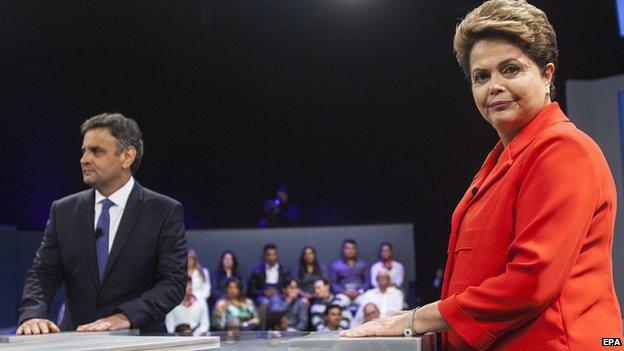
President Dilma Rousseff (R) and challenger Aecio Neves faced off in a bruising TV debate on Friday
All votes count in Brazil - there's no "winner takes all" system as in American states - so each part of this vast country is being fought over by Dilma Rousseff and Aecio Neves ahead of Sunday's vote. Nowhere is the race closer than in the southeastern state where they were both raised, Minas Gerais.
"Minas" is among the most closely contested constituencies in this election and is one in which many features affecting voters in the wider country can be found.
The state capital, Belo Horizonte, is one of Brazil's most agreeable and prosperous cities but its most recent role in the national psyche will be remembered for the wrong reasons.
It was at Belo Horizonte's magnificent Minerao Stadium in front of its own disbelieving supporters that Brazil was dumped out of the World Cup in spectacular fashion by Germany at the semi-final stage. That humiliation aside, the tournament itself went much better than expected and - by hook or by crook - Brazil avoided many of the pitfalls and crises that had been predicted.
Things sort of balanced themselves out - the angst of defeat and footballing disaster countered by the satisfaction of hosting a successful competition.
"Football is a national passion, that's true, but unfortunately for President Rousseff, there will be no World Cup 'bounce', " says local journalist and political pundit Bertha Maakaroun.
People v business?
As we sat in the stands at the Minerao, in front of an empty arena, Maakaroun said people's thoughts and preoccupations have long since moved on from World Cup defeat to who will run this country for the next four years.
"We have a little bit of Brazil in each corner of this state," she continues, "but this is a completely divided state and country - one side standing largely for social welfare and another for good economic management."
Dilma Rousseff has been pounding the streets and pressing the flesh across Minas Gerais, and the other key populous states of the south. In São Paulo and Rio de Janeiro, she urges voters not to abandon the gains of recent years.
While painting an arguably inaccurate and simplistic picture of what is a very complicated country, Dilma says the choice facing electors is a basic one; she and her Workers Party (PT) stand for the "people" and their hard-fought for rights whereas Neves stands for "business and the wealthy."
In the poorer north and interior of Minas, you can find plenty of people who think the same way and will be again be voting for Dilma and a fourth consecutive PT government.
In the small village of Acaiaca I met Dona Cristina, a rural housewife who lives in a very basic brick house and carefully tends a small but impressively varied vegetable patch.
Through a cooperative she sells her best fruit and veg to a local school but, most importantly, thanks to the government's comprehensive welfare scheme she gets a regular income and her basic needs are all met.
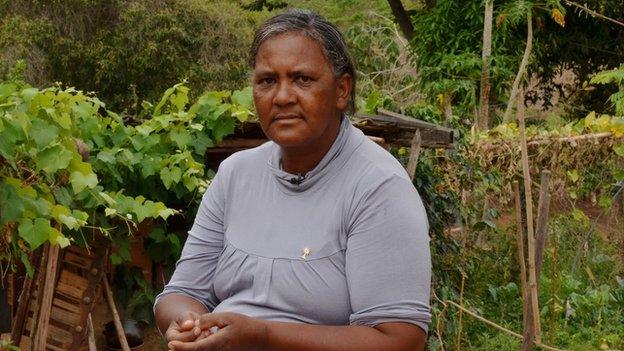
Dona Cristina says the policies of Dilma Rousseff have given her financial security and better healthcare
Dona Cristina is one of an estimated 40 million Brazilians who have been lifted out of extreme poverty in this way and has nothing but admiration for Dilma Rousseff.
"Before we had governments that only gave us the scraps, the leftovers," says the mother of three. "Today we know what our rights are - regarding education and health. We know what we're entitled to."
Mining for success
Throughout the history of modern Brazil the state of Minas Gerais has been hugely significant, its mineral wealth helping to drive economic booms.
En route to the wonderful old colonial city of Ouro Preto, built on the profits of Brazil's lucrative trade in gold and precious minerals, you come across the huge modern mines that have ultimately been key to funding many of the federal government's social programmes.
These days iron ore exported from these hills to China earns billions for Brazil but Dilma Rousseff's government is accused of mismanaging the country's vast resources. Critics say her interventionist polices have driven the economy into recession.
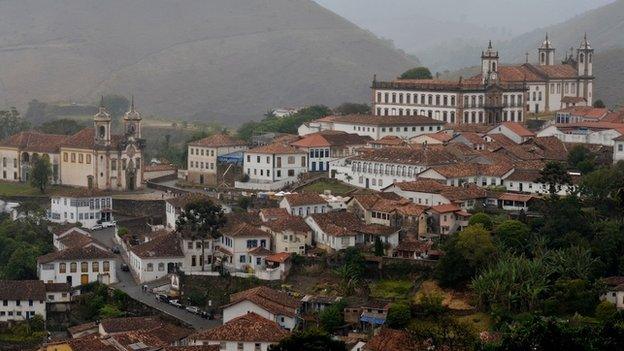
Ouro Preto was built on industry, which supporters of Mr Neves say he is best placed to run
The only person capable of rescuing Brazil, say his supporters, is Aecio Neves - twice governor of Minas Gerais, he's hailed as a business friendly reformer who won't abandon social policies but will loosen economic constraints.
At the upmarket Minas Tennis Club, where both Aecio and Dilma happened to play as children, I met Mr Neves' former aide and friend, Claudio Beato.
"Aecio's main characteristic is that he is a very young kind of leader," says Mr Beato. "He has new ideas about management, crime prevention, health and education. I think it's vital for Brazil to encourage more and more young politicians with new ideas."
Just as Dilma can count on those in rural, poorer parts of this state who have benefited from her targeted policies, Aecio too, can rely on support here, especially from the urban working and middle classes for whom schools, public transport and economic prospects all improved under his governorship.
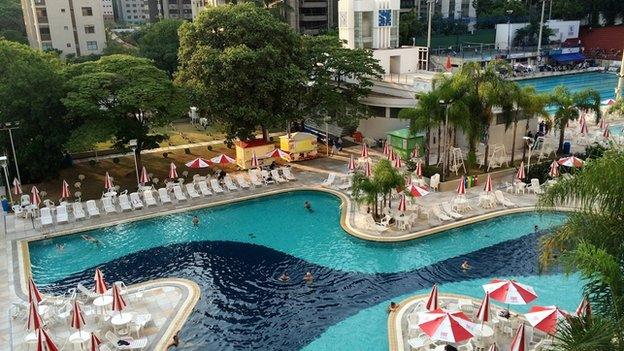
Both candidates frequented the exclusive Minas Tennis Club in their youth
It's been a bad-natured contest from the start, made even more sour in recent days as accusations and counter-accusations of corruption mar the debate.
While the candidates who once relaxed at the same country club in Belo Horizonte are never likely to be bosom buddies, their respective groups of supporters have been trying to out-shout each other in the streets of the state capital.
As in the rest of Brazil, the contest here in Minas Gerais is looking incredibly tight. As the sun sets on what has been a bruising election campaign in Brazil, typified by an acrimonious televised debate on Friday night, it's all just about over … bar the voting.
- Published3 October 2014

- Published5 October 2014
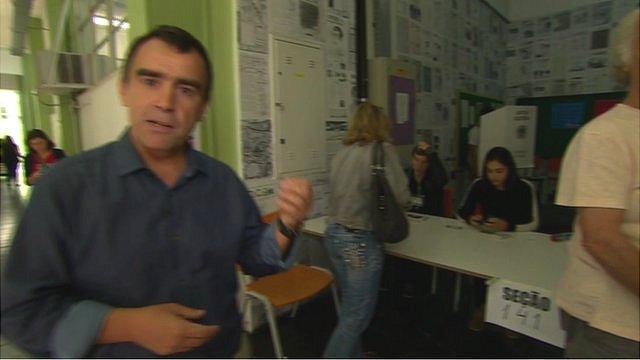
- Published6 October 2014
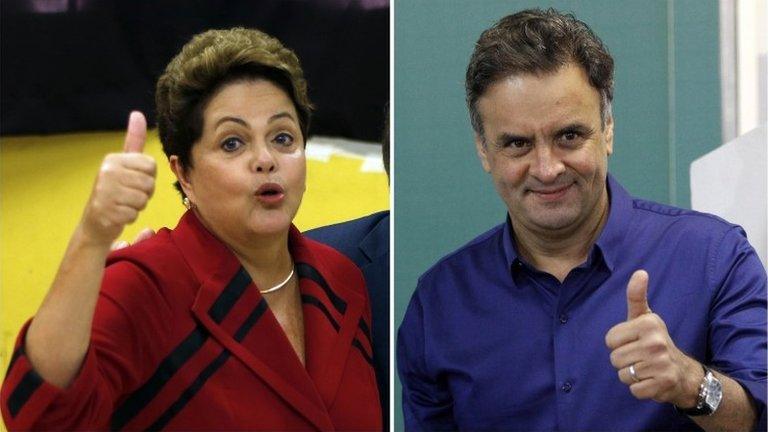
- Published9 October 2014
- Published3 October 2014

- Published4 June 2014